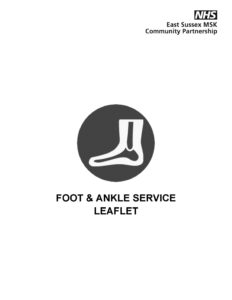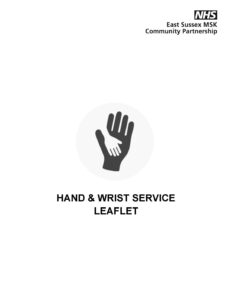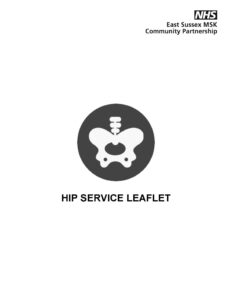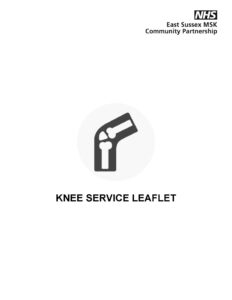Appointment Guide
How to get the most out of your MSK clinician appointment.
When you see any of our musculoskeletal specialists, they will want to assess you and discuss your symptoms. They will suggest suitable treatments and appropriate options so that you can decide together what is best for your care.
What is important to you?
It can be helpful to consider what you might want to achieve from your appointment. For example, a reduction in your pain or a return to something you enjoy. Do you have a specific goal in mind?
What questions should I consider asking my clinician?
Following thousands of appointments, patients have suggested the following questions to ask at your appointment or to use as a checklist to make sure that the following topics are covered:
- What are my options?
- Do I really need this test, treatment or procedure?
- If I proceed with this test, treatment or procedure what are the potential benefits?
- Are there any risks or side effects?
- What will happen if no action is taken?
- How do I get support to help me make a decision that is right for me?
Telephone Appointments:
We will attempt to contact you on your preferred number first. If we have additional numbers for you, or have been instructed to use another number, we may make multiple attempts to speak with you at your designated time. If you are unable to take a phone call as per your appointment details, or need to update your contact details, preferences, or have any other questions, please get in touch
Face To Face Appointments:
Please arrive on time for your appointment. We operate a busy service and if you are late it could mean that you miss your slot and we will have to re-book you in the future. To help plan your route, see our locations page which includes maps and directions for your visit.
Running late?
If you are running late, get in touch and we can talk about options to ensure that minimal disruption to the service, and minimal inconvenience to you, is caused.
Bringing someone with you* –
You’re welcome to bring a relative, carer, or friend to support you. However, family members or friends cannot act as interpreters or chaperones. If you need an interpreter or a chaperone, please let us know in advance.
*If you’re attending a PMP or TRAc Pain Management Programme, we kindly ask that you come alone. Due to the nature of the course, visitors can’t join the session. If someone comes with you, they will need to wait in the waiting area for up to three hours.
What should I wear?
You might prefer to wear loose, comfortable clothing to your appointment, depending on what you are seeing us for. For example, if you are being seen for a knee condition, it may be advisable to wear a pair of shorts or loose trousers, if you have them. You may be asked to remove items of clothing to complete our assessment. If this occurs, we can arrange for a chaperone to be present, at your request. You will always be examined in a private room, or a curtained/screened cubicle.
Do you need to cancel or re-arrange your appointment?
We understand that there are times when you cannot, or do not need, to attend an appointment that has been arranged for you.
Please get in touch as soon as possible so that we can re-book you for a more mutually convenient time, or make other arrangements.
Missing an appointment costs the NHS an average of £165, increases waiting times for you and others, and may result in being discharged back to your GP’s care.
Please afford us as much time as possible if you are unable to attend so that we can continue to utilise all available clinic and clinician time effectively.
What happens if you fail to attend your appointment?
If you fail to attend one appointment, we will be in touch to inform you of this occurrence. You will then be re-booked, in turn, according to our current average waiting times. If persistent non-attendance occurs, we will discharge you from our service until a time where you are able to better engage with your referral. We will inform you and your GP in the event that we discharge you due to non-attendance. If you know that you are going to be late or unable to attend an appointment, please see the above advice for running late or for cancellations.
If you would like to know more see our terms and conditions.
Attending Physiotherapy?
To help manage waiting times and offer you the earliest available appointment, you may be booked with a provider at any appropriate location in East Sussex. if you’re unable to travel to their location(s) or would prefer to discuss alternative options, please contact our team. Please note that choosing a more local provider may mean a longer wait.
Do you need an interpreter or a translator?
East Sussex MSK collaborates with local organisations to offer interpreter and translation services for communication between patients and clinicians. If you need an interpreter or translator, we will organise one for you. If we’ve scheduled an appointment for you and you would like an interpreter or translator, or if you have any questions, please don’t hesitate to
get in touch.
Reminder – family members or friends cannot act as interpreters. If you need an interpreter or a chaperone, please let us know in advance.
Someone to speak up for you (Arranging an advocate)
If you find it difficult to understand your care and support or find it hard to speak up, there are people who can act as a spokesperson for you. They make sure you’re heard and are called advocates.
For example, they can help you:
- understand the care and support process
- talk about how you feel about your care
- make decisions
- challenge decisions about your care and support if you do not agree with them
- stand up for your rights
They can write letters for you and attend meetings with you.
Advocates will support you during:
- assessments
- care and support planning
- safeguarding and reviews
Advocates are independent of social services and the NHS.
To find out more about advocates, see the link below:
NHS.net – Advocate Advice
Patient Participation Group
Can you help us to develop and improve our service by joining a patient forum or by sharing your patient story? To find out more please fill in our form and register your interest.








